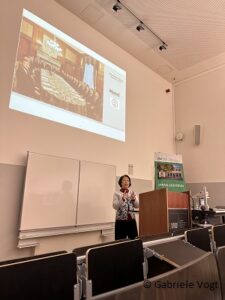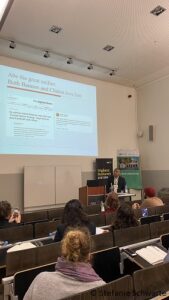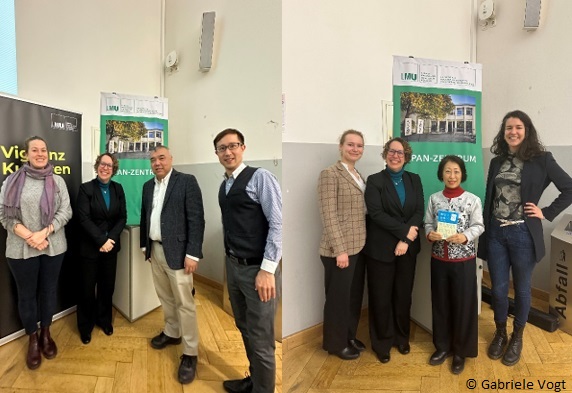This past December, we had the great pleasure to welcome two exceptional political scientists, namely Prof. Mari Miura, Ph.D, and Prof. Koichi Nakano, Ph.D., both from Sophia University, Tokyo, to the Japan Center at LMU Munich. Next to various other engagements, during their stay, Miura and Nakano also gave special lectures on their trademark research areas on female politicians, respectively the political Right. They connected their scholarly output to their political activism as watchdogs of Japan’s democracy. Both lectures critically analyzed current issues in the political sphere of Japan. Being the witty and engaging speakers they are, Miura and Nakano inspired us to keep our senses sharp and show how determined activism coupled with sound research can move and improve society. The invitations were made possible by funding from the Deutsche Forschungsgemeinschaft (DFG) and SFB 1369 Vigilanzkulturen.
 In his talk titled “All Quiet on the Eastern Front: Why is Japan’s Democratic Backsliding Invisible to the West?”, Nakano elaborated on Japan as a competitive authoritarian regime. This concept, developed by Levitsky, is used to describe the democratic backsliding that several liberal democracies face in our times. The “2012 system” is what Nakano calls Japan under the Abe Administration from 2012 to 2020. A simple definition would be: A system of close ties between the LDP, bureaucracy and business actors, minus oppositional political forces that previously strengthened the checks and balances within the political system of Japan similar to the classical “1955 system”. Nakano demonstrated how close the political system of Japan today has come to resemble a competitive authoritarian regime and shed light onto how the so-called West (mis)interpreted the Abe Administration’s stances and actions, thereby doing a disservice to domestic democratic forces that struggle to preserve Japan’s peace constitution. Nakano warned against the consequences for these democratic safeguards when Western leaders condone a Japanese government that is simultaneously fetishized by the Western Far-Right. Nakano concluded with a heartfelt appeal to incorporate peace into security policy so that it focuses on care and cure as common goods. Jane Khanizadeh and Yosuke Buchmeier of Japan Center LMU Munich gave brief context and responded to Nakano’s humorous and provocative analysis before the discussion was opened to the plenum.
In his talk titled “All Quiet on the Eastern Front: Why is Japan’s Democratic Backsliding Invisible to the West?”, Nakano elaborated on Japan as a competitive authoritarian regime. This concept, developed by Levitsky, is used to describe the democratic backsliding that several liberal democracies face in our times. The “2012 system” is what Nakano calls Japan under the Abe Administration from 2012 to 2020. A simple definition would be: A system of close ties between the LDP, bureaucracy and business actors, minus oppositional political forces that previously strengthened the checks and balances within the political system of Japan similar to the classical “1955 system”. Nakano demonstrated how close the political system of Japan today has come to resemble a competitive authoritarian regime and shed light onto how the so-called West (mis)interpreted the Abe Administration’s stances and actions, thereby doing a disservice to domestic democratic forces that struggle to preserve Japan’s peace constitution. Nakano warned against the consequences for these democratic safeguards when Western leaders condone a Japanese government that is simultaneously fetishized by the Western Far-Right. Nakano concluded with a heartfelt appeal to incorporate peace into security policy so that it focuses on care and cure as common goods. Jane Khanizadeh and Yosuke Buchmeier of Japan Center LMU Munich gave brief context and responded to Nakano’s humorous and provocative analysis before the discussion was opened to the plenum.
With their struggles for diverse representation and against democratic backsliding, Miura and Nakano tackled issues that are of growing importance to Europe and Germany as well. Their lectures not only broadened our understanding of Japan, but also joggled our self-conception as critical scholars and critical citizens. They surely instilled us with vigor, so now we more alert about the backsliding in our own political environment and proceed to action.
verfasst von Anne-Sophie L. König
